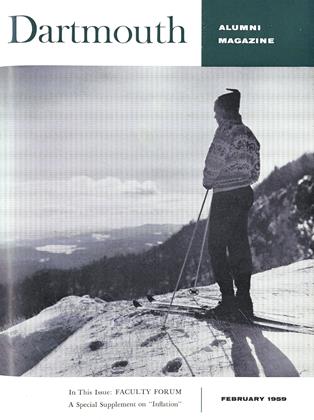WE have long been skeptical of the economic wisdom of advertising, just as we have questioned rain insurance, and herewith we protest the flood of bulk mailings that passes across the far edge of our desk: for charities, for gimmicks, for the alleviation of all known diseases, and for books on economic theory. The latest example was from the "Sleep-learning Research Association," which promised us the possibility of "learning, while asleep, foreign languages, vocabulary, poetry, prose, speeches, mathematics, business facts and figures, Morse Code, and even train schedules." We have still to investigate the possibilities of a treatise received today on "liquid scintillation counting."
The personal approach, however, and the persuasive tongue, are a different matter, as the Fuller Brush Company well knows; and our resident undergraduates are exposed to it in full measure despite the regulation (Information for Undergraduates: II, 6) that permission is required to solicit or peddle in College buildings or to use rooms as salesrooms or storerooms. Permission is granted to fifty or sixty students each year, for such services or sales as laundry, newspapers, magazines, sandwiches, corsages (rarely), calendars, and hot dogs.
In addition, we suspect that a considerable trade goes on in chino pants, chain letters, sports cars, banners, radiators, white bucks, beer mugs, personalized stationery, and various other items without which life would presumably be insupportable. Years ago we had regular service in chocolate eclairs; and both within the
dorms at night, and on the steps of Webster Hall by day, John Spaghett would dispense innumerable plaster casts of fraternity shields, Indians, busts of Dante, and flappers - all fabricated on his
Tuscan farm during the summer and scattered over the eastern academic seaboard in the winter. Other street sales, especially in the fall season, are solicited for blankets, derby hats, and pennants reading "I Hate Football." And there is a considerable unmarketed residue of canvas-covered kapok life preservers, designed as seat cushions, and known in DCAC precincts as "McCarter's Folly."
There is apparently no limit to the ingenuity of entrepreneurs. We recall that once in our shady past, when we were trying to eke out a living as a student in Paris by teaching lower-middle-class American to several jeunes filles,bien élévees, a fellow expatriate alumnus picked up quite a few handfulls of francs by dyeing a lot of goose feathers and parading in front of the Dome and Rotonde during the tourist season with the exhortation: "Buy your winning colors."
As one well removed from dormitory life and its irritations and explosions and blown fuses, we now have scant contact with hawkers. Of course, as a parent, we are solicited for subscriptions to TheDartmouth, for the purchase of scarves, and for funds for the support of children of non-graduates. One of the most enticing appeals we have received lately came from the Student Birthday Cake Agency. A postcard arrived in late November, stating: "Final exams begin the Bth of Dec.; save your son with Food for Thought. Give him a SURVIVAL KIT-delivered to his room at the beginning of exams. STANDARD KIT: 1 doz. peanut butter cookies; 1 doz. chocolate chip cookies ..." to the extent of four dozen. And for only one dollar more: "DESPERATION KIT ..." a 66-piece assortment beginning with "½ doz. tarts," which raised our parental eyebrows.
But we think the most effective direct advertisement we ever received was the one-copy edition of a document laboriously typed out by the ten-year-old daughter of a colleague in his gymnasium office where we were spending a relaxed Saturday morning. It consisted, in more or less accurate duplication, of a series of twenty-five statements: "Phooey on Dartmouth. Princeton will win." Funny thing is, it turned out to be true, but that was not in 1958.
 View Full Issue
View Full Issue
More From This Issue
-
 Feature
Feature"The Nasties Upset Since Bunker Hill"
February 1959 By COREY FORD '21h -
 Feature
FeatureThat Other Dartmouth Carnival
February 1959 By FREDERICK L. BACON '59 -
 Feature
FeatureAlumni Council Dinner Honors Football Team
February 1959 -
 Feature
FeatureThe Central Idea
February 1959 -
 Article
ArticleSome Consequences of Inflation Psychology
February 1959 By COLIN D. CAMPBELL, -
 Article
ArticleShould We Blame the Unions?
February 1959 By MARTIN SEGAL
BILL MCCARTER '19
-
 Article
ArticleNot So Long Ago .... Cry Havoc!
December 1933 By Bill McCarter '19 -
 Article
ArticleThe Hanover Scene
May 1953 By BILL McCARTER '19 -
 Article
ArticleThe Hanover Scene
October 1953 By BILL McCARTER '19 -
 Article
ArticleThe Hanover Scene
October 1954 By BILL McCARTER '19 -
 Article
ArticleThe Hanover Scene
June 1956 By BILL McCARTER '19 -
 Article
ArticleThe Hanover Scene
October 1951 By BILL McCARTER '19
Article
-
 Article
ArticleNEW ENGLAND STATES
January 1924 -
 Article
ArticleCOLLEGE HALL, ALUMNI HEADQUARTERS DURING COMMENCEMENT, JUNE 15-18
June 1934 -
 Article
ArticleAlumni Articles
April 1952 -
 Article
ArticleClass Officers Weekend
June 1962 -
 Article
ArticleNotebook
JANUARY | FEBRUARY 2014 By ELI BURAKIAN '00 -
 Article
ArticleThayer School
APRIL 1964 By WILLIAM P. KIMBALL '29

